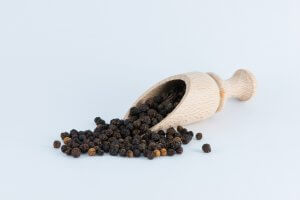What is the best substitute for Black Pepper?
Do you need a black pepper substitute? Are you tired of using the same old black peppercorns in all your recipes? Why not spice things up and add an aromatic twist to your dishes?
While black peppercorns are a staple in most kitchens, there are many other spices that can add depth and flavor to your dishes. From fiery chili flakes to coriander seeds, each alternative brings its unique taste profile to the table.
Not only will these substitutions give your taste buds a delightful surprise, but they also offer a range of health benefits. So whether you’re looking for a fiery kick or a subtle hint of warmth, we’ve got some suggestions for you. So let’s see what you can use as a black pepper substitute. Try using White Peppercorns, Crushed Red Pepper Flakes, Pink Peppercorns, Sichuan Peppercorns, Coriander Seeds, or Green Peppercorns.
What is Black Pepper
Black peppercorns are small, dried berries that come from the Piper nigrum plant. They’re a staple spice in many kitchens around the world and are known for their pungent and spicy flavor. When ripe, these berries are picked, dried, and packed ready to head to the supermarket. They can also be ground to create the familiar black pepper powder that you use in cooking. They’re versatile and can be used to season a wide range of dishes, from savory to sweet. Black peppercorns also contain a compound called piperine, which gives them their characteristic heat. So, whenever you’re looking for that kick of spiciness and flavor in your recipes, black peppercorns are your trusty go-to!
Okay, before we look at your black peppers substitute options, let’s deal with that empty cupboard situation!
Where can I buy Black Peppercorns?
If you want to be more prepared and ensure you don’t run out of black peppercorns, then you should stock up now.
Nowadays, most delicatessens and general supermarkets stock a wide variety of black peppercorns. Or if you prefer you can also purchase black peppercorns on-line.
So why not jump on and place your order today.
STOCK UP NOW!
Whole Black Tellichery Peppercorns
Great tasting and super fresh black peppercorns. Strong bold flavor, with a sweet floral aroma.
16 ounce resealable bag to ensure freshness.
What can I substitute for Black Peppercorns?
Here are some of the best ingredients to substitute the flavor and role that black pepper provides in your recipes.
- White Peppercorns
- Crushed Red Pepper Flakes
- Pink Peppercorns
- Sichuan Peppercorns
- Coriander Seeds
- Green Peppercorns
Black Pepper substitutes
White Peppercorns
Using white peppercorns as a black pepper substitute can bring a slightly different flavor profile to your dishes.
White peppercorns have a milder and less complex flavor compared to black ones. You can grind them and use them just like you would with black pepper. Keep in mind that they won’t add the dark specks that black pepper does, so if visual appeal matters, this is something to consider.
Because white peppercorns are milder, you might want to use a bit more than what the recipe calls for in black pepper. Start with a similar amount, then taste and adjust according to your preference.
White pepper has a more subtle heat that can complement dishes where you want the pepper flavor without an overwhelming spiciness. It works particularly well in creamy sauces, or delicious mashed potatoes, and lighter-colored dishes.
White peppercorns can blend in seamlessly in soups and stews, adding flavor without altering the appearance of the dish. They’re also a common choice in Asian cuisine.
If you’re experimenting with baked goods, white pepper can provide a unique twist. It’s often used in Scandinavian and Nordic recipes to add warmth without dark flecks.
Remember, cooking is all about creativity, so don’t hesitate to experiment with different quantities and dishes. Using white peppercorns can open up new taste dimensions in your recipes.
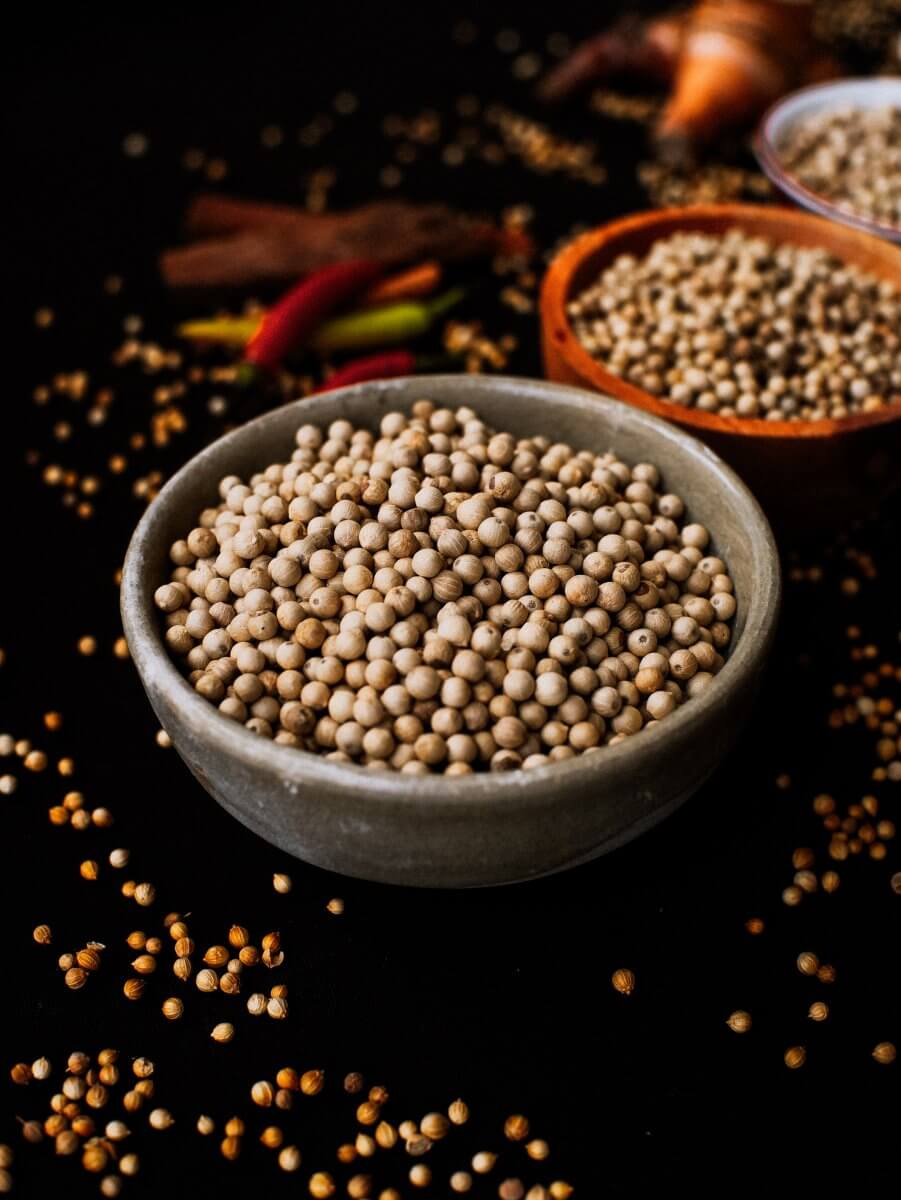
Crushed Red Pepper Flakes
Using crushed red pepper flakes as a substitute for black peppercorns can bring a delightful kick of heat and a touch of different flavor to your dishes.
Crushed red pepper flakes are known for their fiery heat, so if you’re a fan of spiciness, you’ll love this substitution. Just keep in mind that they won’t provide the same depth of flavor as black peppercorns.
Start by using a smaller amount of crushed red pepper flakes compared to what your recipe calls for in black pepper. You can always add more later if you want to ramp up the heat.
These flakes work particularly well in savory dishes like pasta sauces, stir-fries, and marinades. They can add a zing of spiciness that can be a great contrast to other flavors.
If you’re making pizza or pasta and you’re a fan of that peppery heat, crushed red pepper flakes can be a fantastic addition. Sprinkle them on top just before serving to add a burst of flavor.
Experiment with tossing your roasted vegetables in a bit of olive oil, salt, and crushed red pepper flakes before baking. The heat will infuse the veggies with a lively flavor.
You can also create your own chili-infused oil by mixing olive oil and crushed red pepper flakes. This can be drizzled over dishes to give them a spicy kick.
Remember, crushed red pepper flakes are about heat and a hint of smokiness, so they won’t provide the same traditional pepper flavor that black peppercorns do.
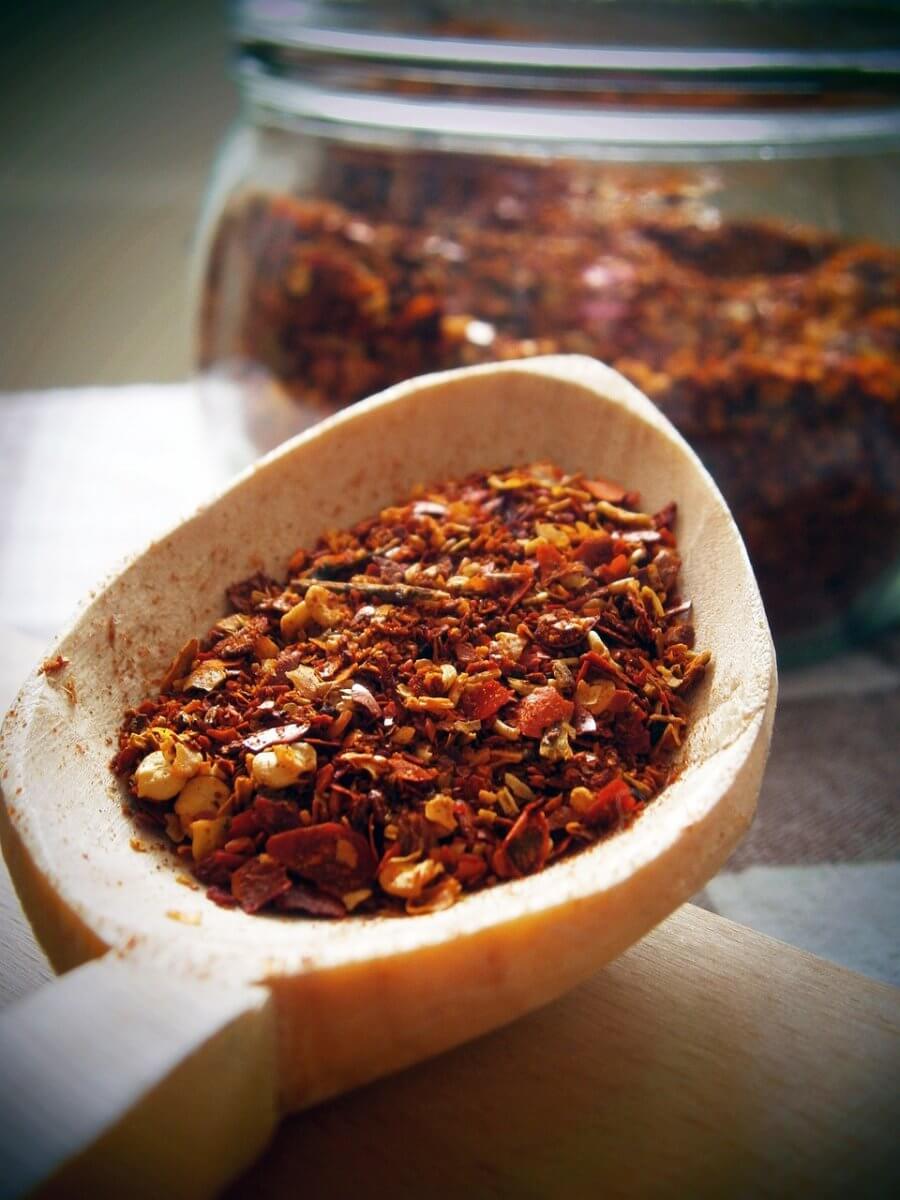
Pink Peppercorns
You can use pink peppercorns as a substitute for black peppercorns to add a unique twist to your dishes!
Pink peppercorns have a milder, slightly sweet, and fruity flavor compared to the more robust and pungent taste of black peppercorns. They can bring a different dimension to your recipes.
One of the standout features of pink peppercorns is their vibrant color. While they won’t provide the traditional dark specks like black peppercorns, they can add a lovely pop of color to your dishes.
Consider using crushed pink peppercorns as a finishing touch on salads, appetizers, and even desserts. Their delicate flavor and striking appearance can enhance the overall presentation.
Pink peppercorns work well in creamy sauces, where their mild heat and subtle sweetness can complement the richness. Think creamy pasta sauces, dips, and dressings.
Since pink peppercorns have a less intense spiciness, they can be a great match for seafood and poultry dishes, adding a hint of pepperiness without overpowering the other flavors.
Pink peppercorns can be surprisingly versatile. Use them in both sweet and savory recipes, like fruit salads, chocolate desserts, or even sprinkled over grilled meats.
Remember to start with a smaller amount than what the recipe suggests for black peppercorns, as pink peppercorns have a lighter taste.
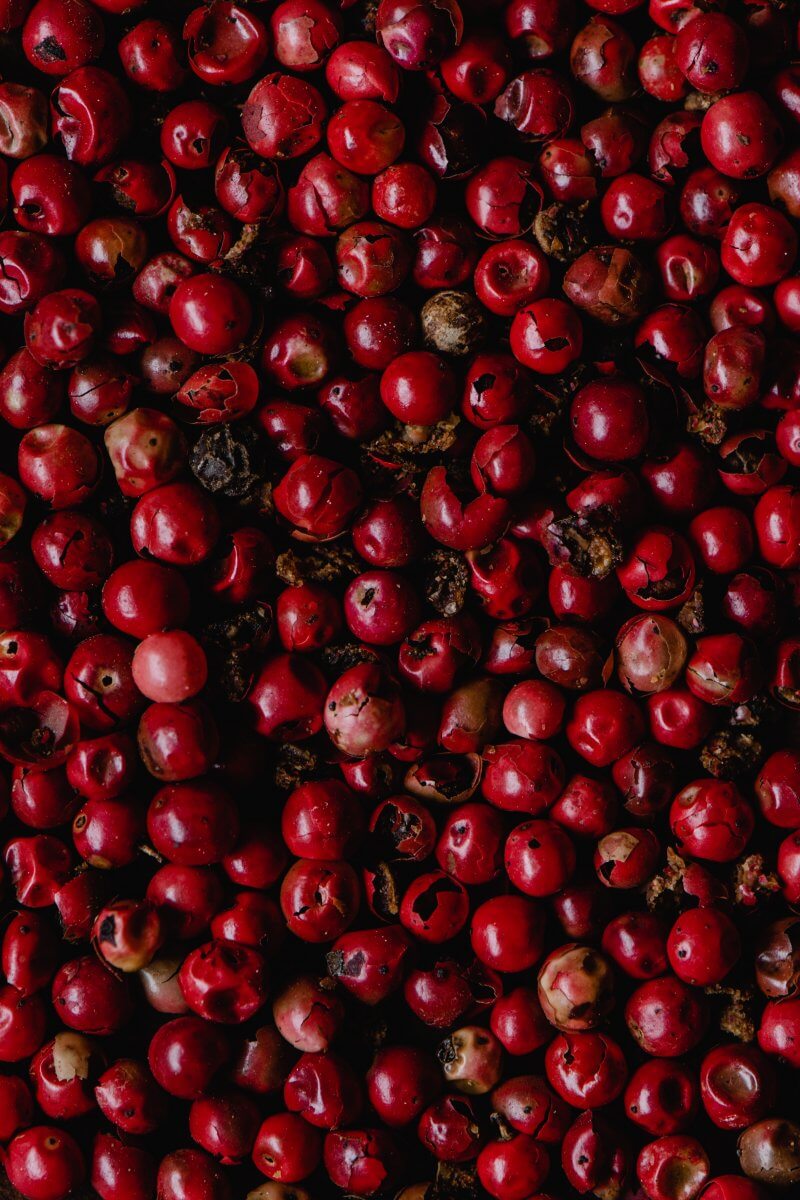
Sichuan Peppercorns
Using Sichuan peppercorns as a substitute for black peppercorns can bring a unique and exciting twist to your dishes!
Sichuan peppercorns are known for their distinct numbing and citrusy flavor, quite different from the straightforward heat of black peppercorns. Keep in mind that they might change the flavor profile of your dish, so it’s great for experimenting with new tastes.
Sichuan peppercorns can be quite potent, so start with a smaller amount than you would with black peppercorns. Gradually increase to find the right balance of flavor and numbness.
These peppercorns are a staple in Chinese and other Asian cuisines. They work wonderfully in stir-fries, noodle dishes, and anything that could use an extra layer of complexity.
To enhance their flavor, dry roast the Sichuan peppercorns in a pan before using them. This can help bring out their aromatic qualities.
Just like black peppercorns, you can grind Sichuan peppercorns and use them in your recipes. They’re particularly delightful in sauces and marinades.
Sprinkle crushed Sichuan peppercorns on appetizers, snacks, or even popcorn for a surprising burst of flavor that will keep your readers intrigued.
You can also infuse oils or sauces with Sichuan peppercorns to capture their unique essence and then use these infusions in your recipes.
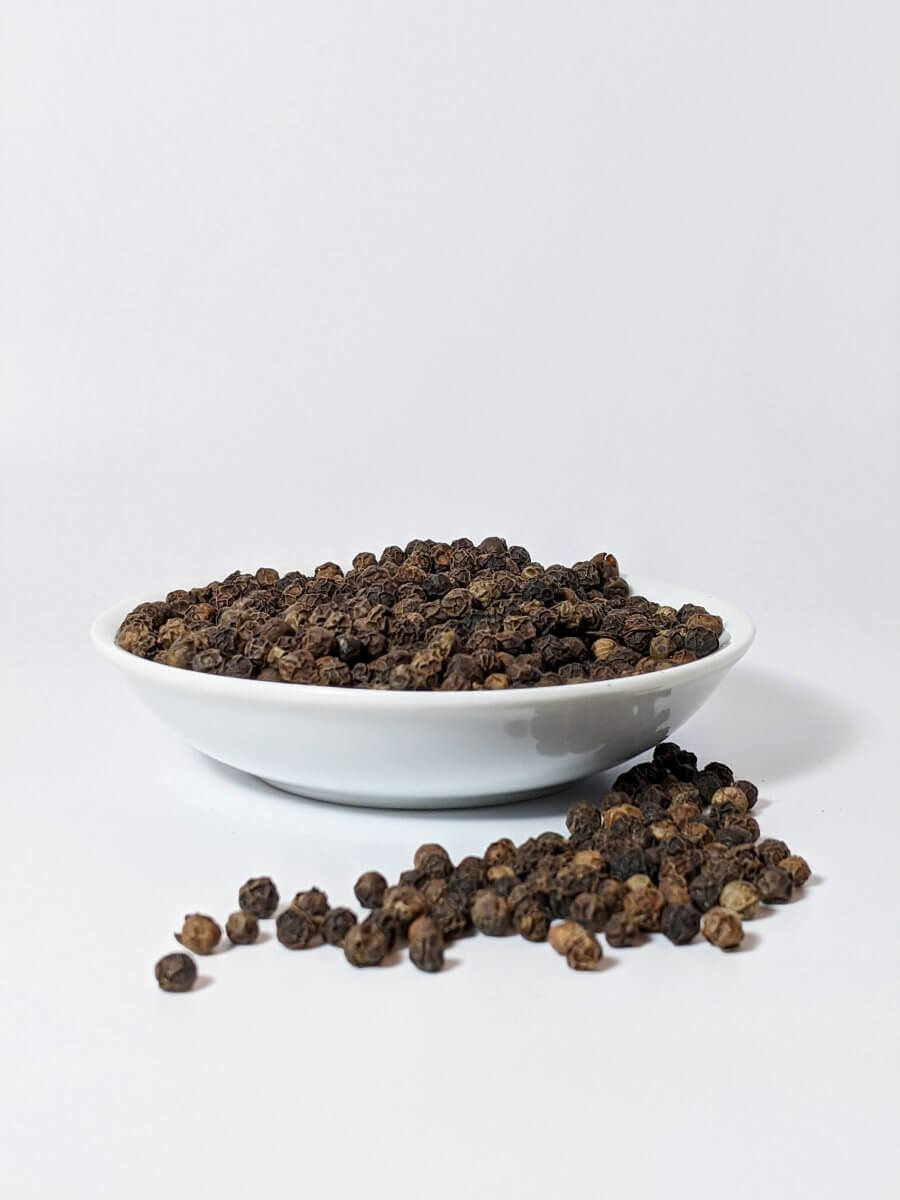
Coriander Seeds
Using coriander seeds as a substitute for black peppercorns can add an interesting twist to your dishes.
Just like black peppercorns, you can toast coriander seeds and then grind them to use as a substitute. Toasting enhances their flavor and aroma, giving them a slightly nutty and citrusy note.
Coriander seeds have a milder flavor compared to black peppercorns, so you might need to use a bit more to achieve a similar level of spiciness. Start with a similar amount and adjust according to taste.
Coriander seeds have a lovely citrusy undertone, which can add a fresh dimension to your dishes. They work well in both savory and slightly tangy recipes.
Try adding ground coriander seeds to soups and stews to infuse a unique flavor. They can complement both meat and vegetable-based dishes.
Incorporate ground coriander seeds into marinades and rubs for meats or even tofu. They can contribute a balanced flavor that’s not overly peppery.
Coriander is a staple in many spice blends, especially in curries. Using coriander seeds as a substitute can create a subtly different taste profile.
Experiment with adding ground coriander seeds to baked goods like bread, muffins, or scones. The citrusy notes can provide a pleasant surprise.
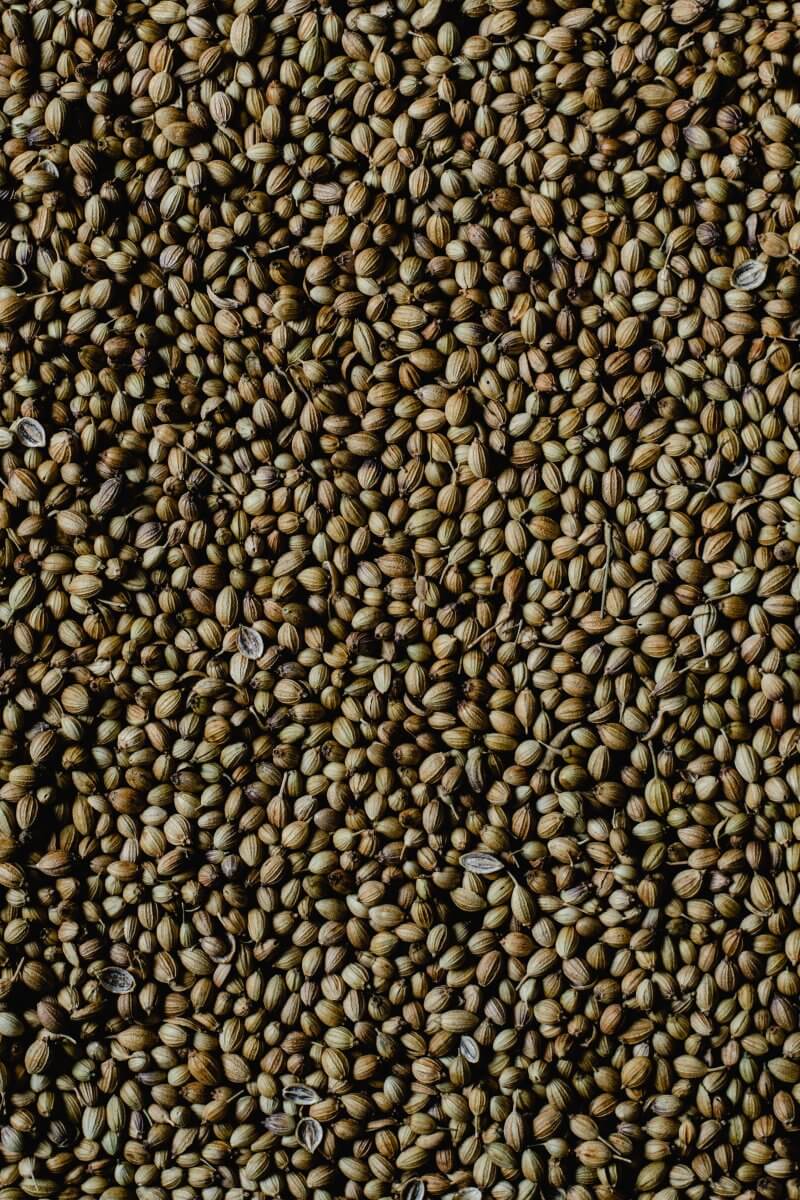
Green Peppercorns
Using green peppercorns as a black pepper substitute can add a unique flavor profile to your dishes.
Green peppercorns are milder and less pungent than black peppercorns. They also have a slightly fruity and fresh taste that can bring a different dimension to your recipes.
Because green peppercorns are milder, you might need to use a slightly larger quantity compared to black peppercorns. Start with a similar amount and adjust based on your taste preferences.
Green peppercorns are often available in brine or dried forms. If using brined green peppercorns, make sure to rinse them to reduce the briny taste. Crush or ground dried green peppercorns and use just like black pepper.
Green peppercorns can be a wonderful addition to creamy sauces and marinades, where their lighter, more delicate flavor can shine through.
Try adding crushed green peppercorns to meat and poultry dishes. Their mild heat and fresh taste can be a lovely complement to the protein.
Incorporate green peppercorns into stir-fries for an unexpected twist. They can work well with vegetables, tofu, or even seafood.
Green peppercorns can add a subtle pop of color to your dishes, which can be particularly appealing.
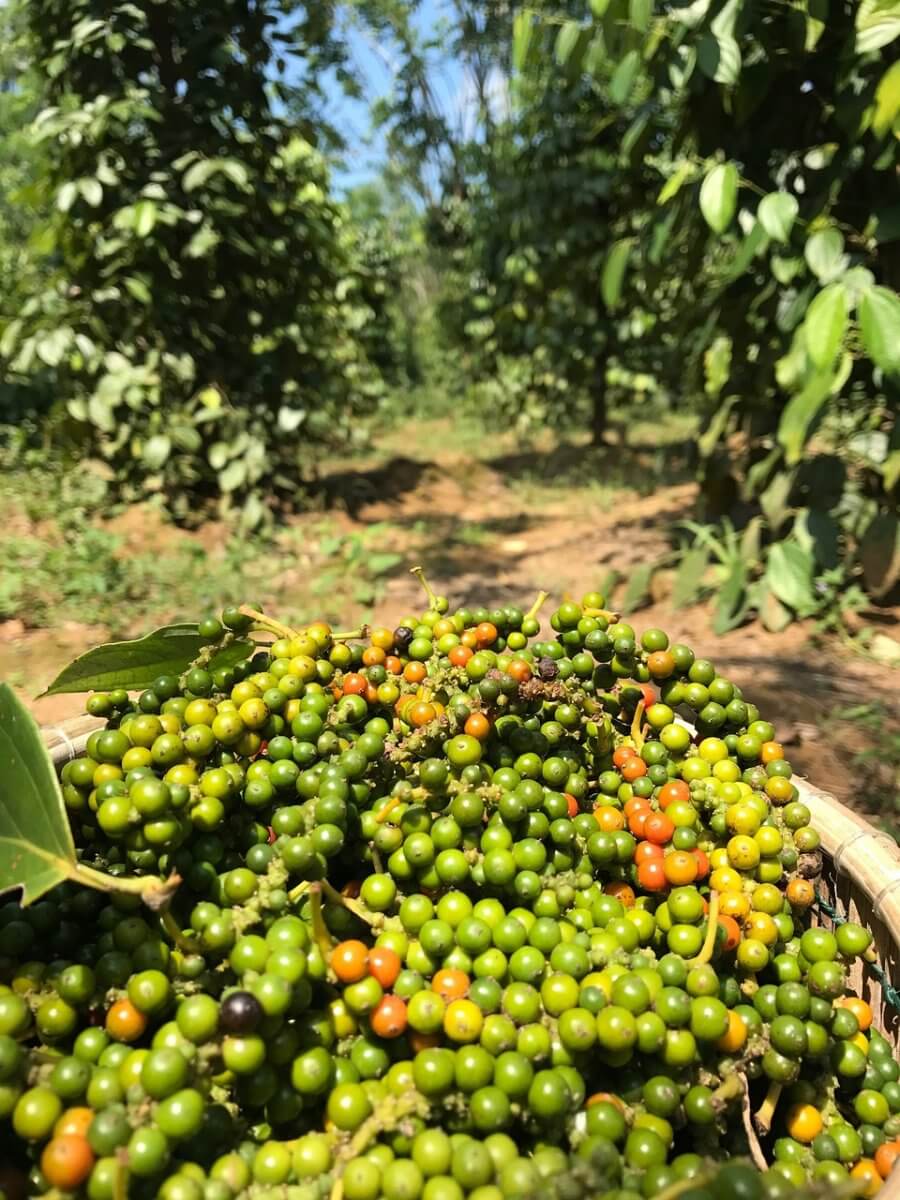
Health benefit of peppercorns
We mentioned earlier that peppercorns offer more than just flavor – they come with several health benefits too! Here’s a rundown of some of the advantages:
- Digestive Health: Peppercorns, especially black pepper, have been used traditionally to aid digestion. They stimulate the production of digestive enzymes, which can improve the overall digestive process.
- Antioxidant Properties: Peppercorns, particularly black and green varieties, contain antioxidants that can help fight free radicals in the body, potentially reducing the risk of chronic diseases.
- Bioavailability Enhancement: Piperine, a compound found in black pepper, has been shown to enhance the bioavailability of certain nutrients, such as curcumin from turmeric. This means it can help your body absorb nutrients more effectively.
- Anti-Inflammatory Effects: Some studies suggest that the compounds in peppercorns may have anti-inflammatory properties, which can be beneficial for managing inflammation-related conditions.
- Weight Management: Piperine in black pepper has been explored for its potential to support weight management by impacting fat metabolism and appetite regulation.
- Respiratory Health: Peppercorns have been used in traditional remedies for respiratory issues. They can help clear congestion and facilitate easy breathing.
- Cognitive Benefits: Piperine has also shown promise in supporting cognitive function and potentially aiding in the management of neurodegenerative diseases.
- Gastrointestinal Benefits: Peppercorns, especially white peppercorns, have been used in traditional medicine to soothe upset stomachs, diarrhea, and other gastrointestinal discomforts.
- Antibacterial Properties: Some studies suggest that the compounds in peppercorns could have antibacterial effects, potentially contributing to oral health and protection against foodborne illnesses.
- Vitamins and Minerals: Peppercorns contain vitamins like vitamin A, vitamin C, and various B vitamins, as well as essential minerals like manganese, iron, and potassium.
Remember that while peppercorns can offer health benefits, they should be part of a balanced diet. It’s always a good idea to consult with a healthcare professional before making significant changes to your diet, especially if you have specific health concerns or conditions. Incorporating a variety of spices and herbs into your cooking can contribute to both your culinary experiences and your well-being!
FAQs
Can I use white pepper instead of black pepper in a recipe
Yes, you can definitely use white pepper instead of black pepper in a recipe, but there are a few things you may need to consider. While both black and white pepper come from the same pepper plant, white pepper has a milder, more subtle flavor compared to black pepper’s sharper, taste. It also lacks the slightly floral notes of black pepper. Also, black pepper generally has a slightly higher heat level than white pepper. Our advice would be to begin with about ⅔ to ¾ of the amount of black pepper called for in the recipe. You can always add more to taste.
Can paprika be substituted for black pepper?
Paprika can be a creative substitute for black pepper in certain dishes, but it’s not a perfect replacement. This is due to the difference in heat and flavor profile, aswell as the distinctive red color of paprika. If maintaining the original character of the dish is important, consider using white pepper instead, which offers a milder pepper flavor without the visual impact of black peppercorns.
Fun Facts
Black pepper power struggle: In the Middle Ages, black pepper was considered so valuable it was used as a form of currency. People would pay taxes, rent, and even dowries with peppercorns! Its worth was comparable to gold, leading to fights and trade wars over control of pepper routes.Sneezy science: The reason black pepper makes you sneeze is a chemical reaction. Piperine, the main compound responsible for black pepper’s spiciness, irritates the trigeminal nerve in your nose, triggering a sneeze reflex to clear the irritant.Fake pepper culprit: Believe it or not, some pre-ground black pepper might not be pure pepper at all! Sometimes, unscrupulous companies add less expensive fillers like sawdust or even wheat middlings to bulk up the product. To avoid this, buy whole peppercorns and grind them yourself whenever possible for the freshest flavor and guaranteed authenticity.
Summary for Black Pepper substitutes
Okay – that’s you all sorted with suitable substitutes for black pepper.
So here’s a quick recap on what you can use as a black pepper substitute:
- White Peppercorns: These provide a milder flavor and can be used just like black peppercorns. They don’t have the dark specks, so consider their visual impact.
- Crushed Red Pepper Flakes: These bring heat and a slightly different flavor. They work well in savory dishes, especially if you’re looking for a spicy kick.
- Pink Peppercorns: These have a mild, fruity, and slightly sweet flavor. They add a pop of color and can be used as a unique garnish.
- Sichuan Peppercorns: Known for their numbing and citrusy flavor, these are excellent for Asian dishes and creative experiments.
- Coriander Seeds: Toasted and ground coriander seeds can add a fresh, citrusy twist to your dishes. They work in both savory and baked goods.
- Green Peppercorns: These are milder and have a slightly fruity taste. They’re great in creamy sauces, marinades, and meat dishes.
Each of these substitutes brings its own unique characteristics to the table, giving you a range of options to explore in your culinary adventures. Why not check out this great recipe for Best Brisket Rub and enjoy experimenting and discovering new flavors.
We have gathered together a lot more facts on ingredients such as herbs, spices, oils, nuts, etc. if you would like to learn some more.
Or if you need to swap out another ingredient have a look at our Substitutes section.
